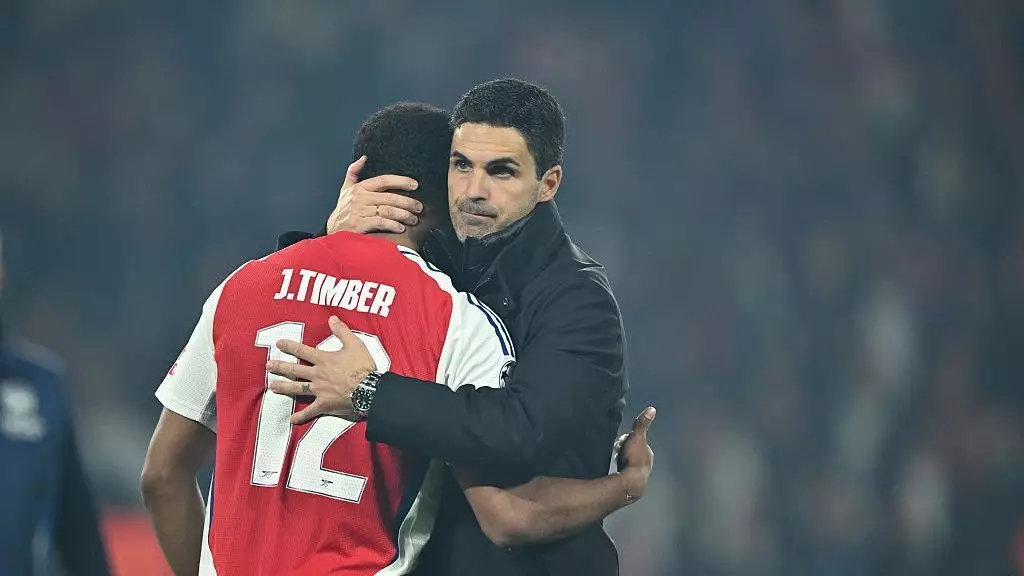In an electrifying encounter that had football fans on the edge of their seats, Arsenal faced Paris Saint-Germain (PSG) in the semifinals of the Champions League. Expectations were high as Arsenal entered the match with vigor, dominating early stages and making a statement with their aggressive gameplay. However, the night ended in disappointment, with PSG emerging victorious 2-1, thus claiming a 3-1 aggregate win. Arsenal’s fast-paced start showcased their potential as they bombarded PSG’s defense, only to be thwarted repeatedly by the impressive Gianluigi Donnarumma, whose goalkeeping prowess would become pivotal in defining the match’s outcome.
In the initial moments, Gabriel Martinelli and Martin Odegaard tested Donnarumma with striking efforts, illustrating Arsenal’s intent to seize control. An air of optimism surged through the Gunners’ resounding supporters, fully believing that their team would break the semi-final curse that had haunted them for years. There was a glimmer of hope as Bukayo Saka also came close, hinting at an impending breakthrough.
The Turning Point: Missed Opportunities
The match, however, took a cruel twist when Arsenal failed to convert their early chances into goals. It was a classic case of “if only,” as a potential early strike could have drastically altered the trajectory of the game. Declan Rice, who later lamented the missed headers and chances, acknowledged how crucial an early goal would have been. “If you score in the first 15 minutes, the game completely changes on its head,” Rice noted, encapsulating the razor-thin margins that determine triumph and despair in high-stakes matches.
In an unexpected twist of fate, a 69th-minute penalty awarded to PSG reinforced the agony for Arsenal fans. Myles Lewis-Skelly’s handball, caught by the VAR, led to a penalty that Vitinha squandered, yet even that stroke of fortune failed to turn the tide. Rice’s sentiments regarding their missed opportunities resonate with many sports narratives, where decisive moments shape the outcome, reminding us that the fine line between glory and grief is often razor-thin.
Arteta’s Reflections: Pride Amidst Pain
Despite the heartbreak, Mikel Arteta’s post-match comments shed light on a deeper truth: pride in performance, even in defeat. His assertion that Arsenal was the superior team during the aggregate play, echoed his profound belief in the squad’s capabilities. “100 percent I don’t think there’s been a better team in the competition,” Arteta claimed, reflecting the internal struggle between the harsh realities of the scoreline and the valiant efforts his team put forth. It’s inspiring to witness a manager standing firmly behind his players, instilling confidence even while facing adversity.
Yet, this pride came tinged with disappointment. The emotional weight of the match visibly affected the players, who bore the heartbreak of unfulfilled promise on their faces. Arteta’s acknowledgment of their tears resonated profoundly, humanizing professional athletes and underscoring the emotional toil that competitive sports entail.
Contrasting Perspectives: A Rival’s View
Luis Enrique, the PSG manager, provided a contrasting analysis of the match. Respectfully refuting Arteta’s claim, he emphasized that scoring goals trumps all theories of ‘better play.’ This juxtaposition unveils an essential truth of football: the winner is not necessarily the one who creates more opportunities, but the one who capitalizes on them. Enrique’s insights serve as a sobering reminder that in football, the beautiful game often rewards efficiency over aesthetics.
Arteta and Enrique’s differing assessments embody a broader debate within sports—what constitutes success, and how subjective interpretations of performance can affect self-belief and morale. The ability to transition from facing setbacks to grasping future opportunities lies at the heart of competitive sports.
The Bigger Picture: Arsenal’s Journey Forward
As Arsenal prepare to reflect on yet another season filled with near-misses, the weigh of history looms large. Their recent struggles in major cup competitions have become a narrative they cannot ignore. Four consecutive semi-final failures highlight a pattern of inability to breach the final barrier, reinforcing the critical need for evolution and resilience within the squad. However, as Declan Rice wisely pointed out, enduring these setbacks is part of the growth process.
For Arsenal, the road ahead must be paved with lessons learned from the pain of this defeat. Their journey is far from over, and overcoming these challenges may ultimately forge a stronger, more united team poised to rise above their past. This sentiment – the potential for greatness rising from moments of failure – is perhaps the most powerful takeaway. The Gunners may have been knocked out of the Champions League, but their spirit remains unbroken, and with it, hope for future triumphs.

